Who was it who said, ‘There’s no there there’?”
A man in the back row raises his hand.
“Not you, you’re my age,” the professor says, waving off the fortyish man. “Let’s let one of the younger ones answer.”
The student sits back, deflated. He won’t dare try to comment again. Like me, he is a “non-traditional student”: mature was the word we used to use, though that’s fallen out of favour, a tacit reminder that nobody really grows up anymore.
The two of us, greying returnees to a system we left 20 years ago, are in an interesting spot. Are we there to contribute, the way we did when we were 19? Or merely to preside in the back rows like stone gargoyles, watching the “traditionals” at their labours?
The number of older students is growing, thanks to “credential creep.” A higher level of education is simply more important than it used to be, particularly in areas such as nursing, business and education. As always, a minority are here just for the fun of it. But most students of a certain age (we are mainly part-timers) are busy with other duties in the outside world, and squeamish about sticking out in a class full of young learners. Hence the growing popularity of distance learning, during which you can study, as one online commentator put it, “while wearing fuzzy bunny slippers and drinking scotch.”
I’ve tried that route, too, but it’s a pretty lonely slog. Your professors and classmates are so far-flung and invisible that they may as well be fictional. There are no debates, no peals of laughter, no interesting tangents or provocative questions. The scotch and slippers are a definite plus, though, and should probably be incorporated into traditional classrooms.
Classrooms are where learning really happens – thanks to challenging, brilliant professors, yes, but also thanks to students. The world can narrow horribly as we age; we know that there are people living outside our offices and neighbourhoods, but we have little to do with them. In university, we were regularly exposed to people from all races, creeds, cultures, orientations – and age groups, too, if we were lucky. That diversity of perspectives is a gift we took with us before disappearing into the tiny warrens of work and family. If you’ve lost it, it’s worth going back for. Even 20 years later.
I have one class at Convocation Hall, and the building hasn’t changed. The sense memory of a hundred hangovers has me slumped in a seat that seems impossibly tiny, since it was not only 20 years, but 20 pounds ago that I sat here. I remember watching my fellow graduands file forth to collect their degrees on that hot June day in 1986 and thinking that those chandeliers must surely be ready to fall on them. But the ancient fixtures are still there, inching scarily out of the ceiling like stalactites.
Otherwise, the campus has changed a lot. I’ve missed the massive technological conversion of the 1990s, and the battles over identity politics and the “canon.” Nobody marches about cruise missile testing, or South Africa, or abortion laws like they used to. Plagiarism was much more difficult back then: professors warned against it perfunctorily, like flight attendants demonstrating how to use oxygen masks. Now they are crazed with paranoia on the subject, and rightly so, since all you have to do is press a couple of buttons on your laptop and the contraband shimmers to life before you.
Being yesterday’s woman, I cannot bear to lug a laptop to class. This means I am deprived of the ability to play Minesweeper during my breaks, but that’s a sacrifice I’m willing to make. We didn’t have Minesweeper in 1986; we had to talk to each other. One conversation sticks out in my memory.
In the fall of 1985, I enrolled in a renaissance history course. It was relatively small, as classes were in those days. There was a middle-aged woman in my tutorial. I don’t remember her real name, so let’s call her Lois. She wore sensible loafers, A-line tweed skirts and a cameo brooch (nowadays, we the fortyish wear jeans, runners and T-shirts with sports logos on them, and the truth is we all look a bit like desiccated camp counsellors).
Lois can’t have been much older than I am now, and probably returned to school after raising a brood of children. She knew all the answers and did all the readings: you know the type. Writer Thomas Merton sniffily described one such person, whom he taught before entering the monastery: “She was one of those middle-aged ladies…who handed in neat and punctilious themes and occupied, with a serene and conscious modesty, her rightful place as the star of the class. This entitled her to talk more than anybody else and ask more unpredictable questions.”
Well, Lois was one of those. I was wary of her, since she held a mirror to what I so glaringly was in those days – a lousy student. One day I was leaving “Sig Sam” after a rare bout of studying. Lois saw me and called my name. I tried to dodge her, but it was no use. I was in no mood to discuss essay topics, or the content of the last lecture, since it was a course from which I’d pretty much gone AWOL. My hair was a wreck, my lipstick smeared; it was the studying after the partying before. Was it, perhaps, the night I fell asleep on the kitchen floor – the morning I woke up with actual wood splinters in my cheek?
But there was Lois, bright-eyed and perfectly coiffed. “You know,” she said, “the professor is tremendously impressed with your opinions. In fact, he won’t start the tutorial without you. Where have you been? We want you back!” I – with parents 2,000 miles away, abstractions rarely seen – was being watched. It was creepy, but exciting too. It made me think that learned people actually valued my views on Petrarch and Erasmus, contaminated as they were with “likes” and “you knows”; the professor, of course, but more importantly Lois. Someone who took learning seriously: someone you could watch, weekly, being transformed by it.
I am a mother myself now, and I know how the breed works. We are natural saviours, gravitating always to the fallen, and so maybe Lois’s lure was just a con. In any case it worked. I returned to Renaissance history and aced it. We often criticize the over-parenting of today’s students, but sometimes a little peer mentoring isn’t such a bad thing. Sensible Lois – traditional and mature Lois – where are you now? I’m glad to have had you in my class.
It is true that, for years, women have taken up books at mid-life. Often we are reminded of how the world sees us. “I get requests from lots of groups like this,” moaned one male author on a visit to my book club, rubbing his temples. “It’s always the same – middle-aged women.”
Perhaps the poor man was girding himself for the onslaught of our opinions. In youth, we pretended to know everything, when in fact we knew nothing. In our 40s it’s the other way around: we are always feigning interest and innocence. Our opinions are largely formed and our minds closing, and the fight to keep them open gets harder every day. Merton was right – we try not to bug the professors, but we do. “Dr. So-and-So,” we say, “Have you ever read… I don’t think that’s what it says… Perhaps you should…” For which we get bored looks, ones that say: Am I wrong? Maybe. It’s still going to be on the test.
So maybe you can’t go home again. Or maybe you can: as David Denby recounted in Great Books, his terrific book published in 1996 about returning to school at age 48, it is fascinating to study Marx after spending years in the workplace; King Lear after seeing your parents age; Austen after courting and marrying; Hobbes after being robbed or cheated. We read such works to see what life will be like, but we rarely look back to see if they were right.
A warning, though: if you do go back, they will make brutal fun of you. Your friends and family, that is. Oh sure, they will make all the appropriate noises about how much they admire you; how they’ve always wanted to go back, too. They will ask what you’re reading. They will seem to be serious. But the second you tell them your final exams are over, they won’t be able to resist. “Dude!” they’ll smirk. “Keg party!” You will ignore them, because you are a scholar – someone who can recall, effortlessly, that it was Gertrude Stein who told us there was “no there there.” But, of course, you knew that. Didn’t you?
Cynthia Macdonald (BA 1986 St. Michael’s) is a writer and part-time social sciences student at the University of Toronto.
Recent Posts
U of T’s 197th Birthday Quiz
Test your knowledge of all things U of T in honour of the university’s 197th anniversary on March 15!
Are Cold Plunges Good for You?
Research suggests they are, in three ways
Work Has Changed. So Have the Qualities of Good Leadership
Rapid shifts in everything from technology to employee expectations are pressuring leaders to constantly adapt







2 Responses to “ Going Back ”
This brought back vivid memories of my years as a mature student at U of T from 1974 to 1977. At the age of 45, I entered Trinity College through a program for adults who had no formal high school diploma. I had been a professional writer for many years, with two books under my belt, and careers in advertising and marketing. But in my classes, I was just “John” – an old guy in sweater and jeans. With absolutely no experience of university life, I had a steep learning curve. My intention was to major in social anthropology and then earn a master’s degree in what was then called museology. As with Cynthia, I made friends among my classmates, who accepted me even though I was old enough to be their father. I often wonder what happened to them. Megan sat next to me in first-year history and helped me learn how to study again. Mary fearlessly interrupted our professor to ask, “What’s your point?” Duncan asked me whether he should quit university. I think I convinced him to stay.
My fellow graduate students were not as friendly and far more competitive, but my years as a mature student were richly fulfilling.
John Fisher
BA 1977 Trinity, MMSt 1979
Uxbridge, Ontario
Cynthia Macdonald’s article reminded me how fortunate I was to attend classes with “mature” students back in the 1980s. Like most young people, we didn’t appreciate how much our older peers added to the classroom dynamic. Their wealth of experience and genuine interest in the subjects generally went unnoticed.
I befriended two older students in particular. They both attended classes part time: one held an administrative job at U of T and the other was a German academic. They both felt passionately about Bronze Age archeology and questioned theories in a way that the rest of us didn’t. These wonderful people encouraged me to continue with my studies and earn a PhD. One of them even accompanied me to Greece and helped challenge my theories over a glass of retsina at the end of a day of fieldwork. I would not have achieved all that I did without the support and encouragement I received from my older friends.
Nancy Claire Adams (née Loader)
BA 1989 Victoria
Edinburgh, Scotland